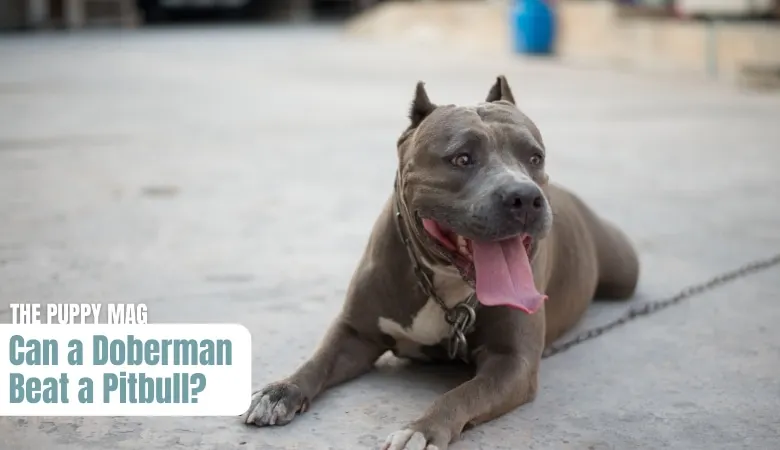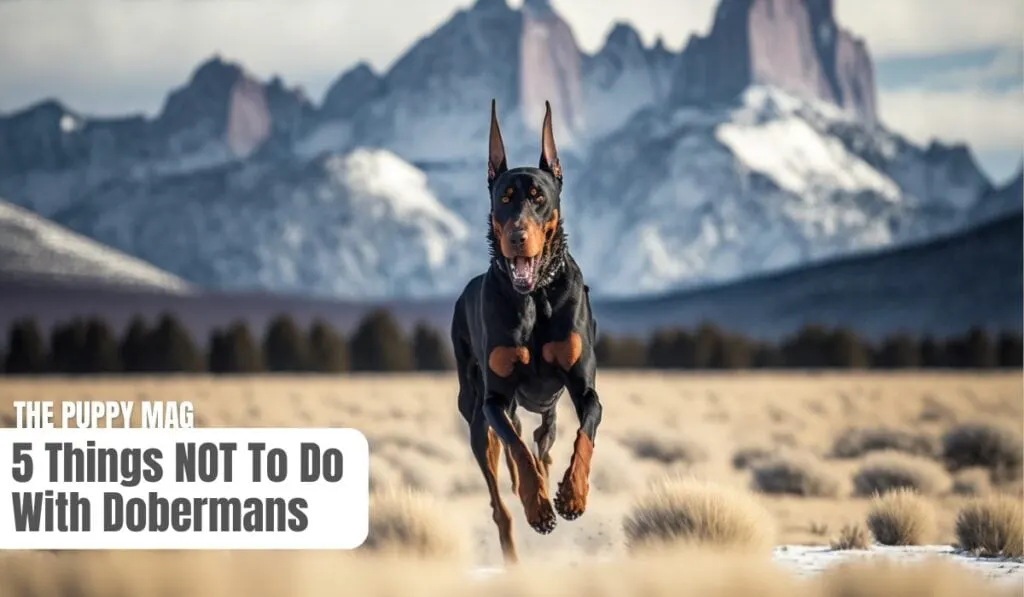Who would win between a Doberman and a Pitbull?
It’s a surprisingly popular question, so here’s our take on it. First of all, it’s important to mention that we do not condone dog fighting in any way whatsoever.
Sometimes a Doberman would win and other times a pitbull would win. It’s fairly even and very hard to give a definitive answer. While Dobermans have advantage with their size, pitbulls have the advantage of having a stronger bite force.
In most, cases it depends on which breed lands the first successful attack.

Doberman Vs Pit Bull: Who Would Win?
It’s hard to call, and first impressions lead us to believe it’s pretty even.
While Pitbulls are instinctual fighters, compact, quick, and powerful, Dobermans also have an edge with their size and willingness to fight to death.
The truth is that sometimes a Doberman would win, and other times a Pit Bull would win. In the long run, however, Pit Bulls may have the advantage due to their fighting history.
Regardless, it’s certainly not a battle that you would want either your Pitbull or Doberman to engage in while at the dog park.
Despite who would come out on top, a serious amount of damage can be done quickly by both of these breeds.
⭐ Related: Can a Pitbull Beat a Wolf?
⭐ Related: Can Dobermans & Pitbulls Get Along With Each Other?
Who Has a Stronger Bite?
Do Dobermans or Pitbulls have a stronger bite?
Most pitbulls have a stronger bite force than a Doberman. Dog bite force is typically measured in PSI (Pounds Per Square Inch). Dobermans have a bite force of around 229 PSI whereas Pitbulls have a bite force of around 245 PSI
However, it’s important to remember that there are various factors that come into play with bite force.
Some Pitbulls may have the edge depending on their training, age, body composition, and health in general. The same is also true for Dobermans.
Related: Can a Doberman Beat a Rottweiler?
🎯 You Might Also Like:

Is a Doberman or Pitbull More Aggressive?
Which breed is more aggressive?
This is a question asked by both existing and prospective owners.
The simple answer is that Pitbulls are considered more aggressive towards other dogs than Dobermans. But Dobermans are prone to be more aggressive to strangers than Pitbulls.
This is likely due to Pitbulls having a long history of being bred to fight other dogs, whereas Dobermans were used primarily as guard dogs, protecting against strangers and other people.
Of course, nothing is set in stone, and every dog varies.
Some Pitbulls may be far less aggressive than any given Doberman.
Ultimately, aggressiveness is dictated by the way individual dogs are raised and the kinds of early-on socialization training each dog has received.
Recommended read: Why Do Dobermans Have Their Ears Cropped? The Real Facts
Which Is a Better Guard Dog? Doberman Or Pitbull
Although many people use Pitbulls are personal guard dogs, there’s no doubt that Dobermans make superior guard dogs.
Their size, intelligence, and instincts always favor the Doberman for guard dog duties.
The main reason is down to the fact that Dobermans have been used primarily as guard dogs for a very long time. Most notably, since World War II.
This doesn’t mean Pitbulls can’t make good guard dogs because with the right training they certainly can!
But if we compare these two breeds specifically, the Doberman comes out on top.

Psst. A quick update on Doberman training! Brain Training For Dogs could be the best training approach we’ve seen for Dobie pups. Results show improvement in obedience and behavior quicker than we thought possible! Check it out.
Are Pitbulls Stronger Than Dobermans?
Whether or not Pitbulls are stronger than Dobermans is another difficult one to call, but in most cases, it will actually be the Doberman that’s stronger.
In many cases, a fully grown adult Doberman will be stronger than a fully grown Pitbull, simply because of their larger build and overall size.
This, however, won’t always be the case…
Some exceptionally large Pit Bulls (perhaps caused by selective breeding) could end up being stronger than a Doberman of the same age.
There’s no doubt that Pit Bulls have tremendous amounts of muscle, drive, and power.
Another way to consider this would be the difficulty of trying to hold back a fully grown Pitbull, compared to a fully grown Doberman. A Doberman will nearly always be harder to restrain.
Interesting read: Are Dobermans and Dachshunds related?
Which Breed Is Better?
We get asked this question a lot… But the problem here is the word “better”.
It’s hard to say any particular dog is “better” than another. It all depends on what the owner has preference to.
Both the Doberman and Pitbull have their pros and cons, but both are capable of being exceptional dogs with a lot of love, affection, and kindness to give.
These dogs are obviously very powerful, strong, and potentially dangerous when raised incorrectly. This is something crucial to consider.
Dobermans can be harder to train than Pitbulls, and some may say it takes a little more experience to raise a well-behaved Doberman than it does a Pitbull. But that’s a subjective observation.
And yeah, is it Pitbull or Pit Bull? (we think people spell it both ways!)
FAQs
Let’s run through some of the most commonly asked questions on this topic (not already covered above!)
How do the stamina and endurance levels of Dobermans compare to Pitbulls in prolonged activities or confrontations?
Answer: Both breeds have high levels of stamina and endurance, essential for their historical roles. However, Pitbulls, with their stocky build and fighting background, might have a slight edge in sustained confrontations. On the other hand, Dobermans, being bred as guard dogs, possess prolonged alertness and readiness.
Are there any specific training techniques or exercises recommended to manage aggressive tendencies in these breeds?
Answer: Socialization from a young age is crucial for both breeds. Consistent obedience training, positive reinforcement, and avoiding negative or punitive methods are recommended. Activities that allow them to channel their energy, like tug-of-war (under supervision) or agility training, can help reduce aggressive tendencies.
Given their history and primary use, which breed is more likely to initiate a confrontation when meeting a new dog?
Answer: Pitbulls historically were bred for dog fighting, making them more likely to be dog-aggressive. Dobermans were primarily used as guard dogs, meaning they might be more wary of strangers but not necessarily aggressive towards other dogs. However, individual temperaments can vary widely within any breed.
Do either breed have any known weak spots or vulnerabilities that can be exploited by the other in a confrontation?
Answer: Physical weak spots might not differ significantly between breeds, but Dobermans, being taller, might have a throat more exposed than the stockier Pitbulls. However, it’s essential to understand that how a dog is raised and trained can often be more critical than any physical vulnerability.
Considering their historical roles (Dobermans as guard dogs and Pitbulls as fighters), which breed is more likely to back down from a confrontation?
Answer: Historically, Pitbulls were bred to be relentless in confrontations, making them less likely to back down. Dobermans, while fiercely protective, might assess threats and retreat if they perceive the situation to be too risky. Again, individual temperaments and training play a significant role in a dog’s reaction.
Last Thoughts
The Puppy Mag does not condone dog fighting. This article was made solely for educational purposes as many of our readers have asked us this very question.
Be sure to check out more Doberman articles >>>
Additional Info
Doberman AKC
Pitbull
